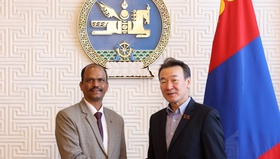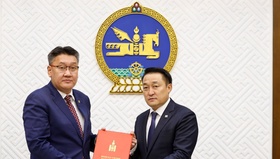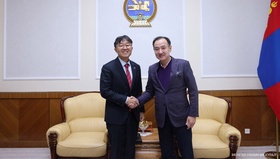Ms. L.Ulziisaikhan participated in the virtual meeting of the Association of Secretary Generals of Parliaments (ASGP), in parallel with the 142 Assembly of the Inter-Parliamentary Union.
The two-day exceptional meeting convened under the general theme of ‘The role and organization of Parliaments during a time of pandemic’. More than 110 participants attended the meeting and discussed the effects and the changes the COVID-19 pandemic has had on the legislative processes and their corresponding parliamentary responsive actions and innovations.
During the meeting, Secretary Generals from Spain, Algeria and Madagascar shared their cases on the formulation of Special Procedures for the digitization of parliamentary plenary sessions and the enactment of amendments to corresponding legislations. Suriname, Romania, Qatar and South Africa were amongst the nations in which hybrid sessions were implemented, whereas the Parliament of Brazil and its Secretariat have become fully digitized, with documents from the last decade being converted into digital formats. In addition, digital signatures have been introduced across its Parliament and its Secretariat.
It has been noted that despite the successful introduction of digitization in the work of parliaments around the world, there has also been notable technical difficulties. Participants acknowledged that the use of digital technology to support parliamentary activities during the pandemic has had a positive impact on increasing session attendance, improving session procedures, and saving budget and time. On the other hand, participants agreed on the need to address the issue of voting accuracy, technological security, and the formulation of guidance on virtual parliamentary procedures.
In the presentation sent to the ASGP by Ms. Ulziisaikhan Luvsandorj, she shared the experiences of Mongolian Parliamentary actions during the pandemic stating that “The Parliament of Mongolia adopted the Law on the COVID-19 pandemic in 2020. The legislation aims to prevent and combat the pandemic, protect public health and reduce its negative social and economic impact”. As a result of all parliamentary sessions and sittings being digitally convened in relation to nationwide lockdowns, related legislative procedures have been fully digitized. In this context, for the first time in parliamentary history, 2021 State Budget was approved digitally within the its timeframe.
In her presentation, Ms. Ulziisaikhan Lubsandorj also stated that “to ensure public participation and citizen engagement in the legislative process, the Parliament of Mongolia holds consultative polling sessions, public hearings, meetings, workshops and discussions. To further enhance this process, Parliament has introduced lawmaker and lawforum online platforms where the public are able to vote on draft legislation and provide crucial feedback.
In support of youth engagement in the parliamentary process, a comprehensive parliamentary education programme has also been developed. The Parliamentary Research Institute of the Secretariat of the Parliament is currently developing a Parliamentary Education Handbook for secondary school students. The handbook is to be published in two categories: 12-14 year olds and 15-17 year olds, and will cover a total of 12 topics, including the specifics of parliamentary activities, democratic principles and values. A website to distribute parliamentary educational content is also currently under development. In the case of Germany, the focus has been on parliamentary education and the introduction of e-seminars for secondary school-age students under a special program”.
Kenya and Brazil stated their work of stepping up parliamentary oversight of government operations during the pandemic. Although Thailand has introduced electronic technology into its day-to-day operations, it has decided not to hold electronic voting on key issues in regards to the Constitution and parliamentary plenary sessions.
The IPU has begun developing programs to support the work of parliaments in the event of another pandemic and have developed self-assessment tools for parliamentary oversight and identifying challenges. In this regard Mr. Martin Chungong, Secretary-General of the IPU gave a presentation on the newly established Parliamentary Centre for Innovation.
Participants also discussed other items on the Agenda of the ASGP, including the Association’s future plan of action, under the general theme of ‘The role and organization of Parliaments during a time of pandemic’.

 Eng
Eng  Монгол
Монгол

